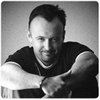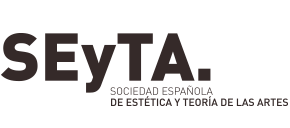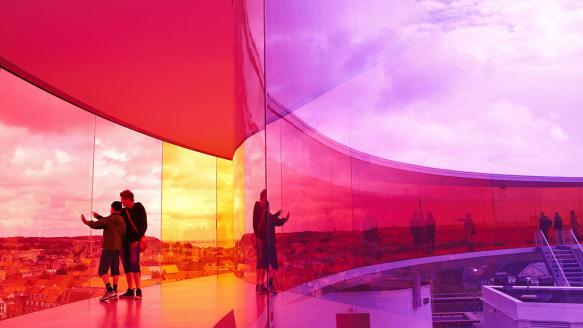Aarhus Institute of Advanced Studies Conference
MORE THAN PRETTY PICTURES – The Aesthetics of Data Representation
April 13-16, 2015
This interdisciplinary conference explores visual and aesthetic challenges related to data representation across disciplines and research methods. The conference covers a variety of cross-disciplinary issues relating to scientific and aesthetic representation, and to data visualization in particular. From an innovative and creative cross-disciplinary ground a number of dynamic proposals will be presented during the conference, including keynote presentations, paper presentations, panels and hands-on workshops. Experts will share and discuss methods, aesthetic theories and ideas of data representation in the sciences as well as in art.
Confirmed keynote speakers include: Prof. James Elkins (US), Prof. Martin Krzywinski (CA), Prof. Dominic Lopez (CA), Creative Director Kelly Krause (UK).
Dates and venue/
April 13-16, 2015 at Aarhus Institute of Advanced Studies (AIAS), Aarhus University, Buildings 1630-1632, Høegh-Guldbergs Gade 6B, 8000 Aarhus C, Denmark. See location on map.
Conference theme/
In general we represent data by use of different strategies that are culturally, aesthetically, and practically informed. In the current age of information, more data are constantly generated and data representation plays an increasingly important role in our understanding of the world surrounding us. Nanoscience and microbiology to a great extent depend on visualizations of invisible data; we generally expect works of art to contain a deeper meaning than what meets the eye; charts and graphs are important tools of communicating big data in social sciences; vast amounts of data generated in physics experiments are converted to visual outputs in order to make sense of the results. We constantly provide, explore, analyse and communicate data that are not immediately accessible to human senses.
This conference transgresses traditional boundaries between the institutional discourse of art and science, and sets out to investigate the current (and future) state of data representation in a cross-disciplinary manner in order to share insights from different fields (of aesthetics and science) and provide valuable new perspectives to our understanding of data representation. Subjects cover different concrete expressions in scientific and artistic data representation as well as theory on representation and visualization in general. Relevant questions asked by the conference include:
- Is there such a thing as ‘pure’, non-aesthetic scientific data representation?
- What is the relation between form and content in current artistic practices?
- What are the relations between concrete scientific tools (lab protocols, hardware, and software), the researcher developing and using these tools, and the target audience of the data representation (other scientists or broader public)?
- What should, on the one side, science and, on the other side, art aim for when developing methods and strategies for representing data?
- Why do scientific data visualization so rarely take the form of expressive cartoons images?
- What does artistic data mining look like as compared to scientific data mining?
- What are the pros and cons of using visualization as a strategy of data representation, as compared to strategies that address senses like hearing, smelling etc.?
- How does, or should, audiences, ethical issues, scientific messages, design, cognitive issues, culturally aesthetic traditions and much more shape data representation?
Confirmed keynote speakers/
 James Elkins
James Elkins
Elkins (US) is a professor of Art History, Theory, and Criticism at the School of the Art Institute of Chicago. He has written extensively on visual cultures in art history and in science. His books include Visual Practices Across the University (2007), What is an Image? (2008), and Visual Literacy (2008). http://www.saic.edu/profiles/faculty/jameselkins/
 Martin Krzywinski
Martin Krzywinski
Martin Krzywinski (CA) is a scientist and bioinformatics at the Genome Science Centre in Vancouver. He works on problems in data visualization applied to cancer research and genome analysis.
http://mkweb.bcgsc.ca
 Dominic Lopez
Dominic Lopez
Dominic McIver Lopes (CA) is a professor at the Department of Philosophy at University of British Columbia in Vancouver. He has done extensive research in aesthetics, picture theory, visuality and art. He has authored Beyond Art (2014), A Philosophy of Computer Art (2009), Sight and Sensibility: Evaluating Pictures (2005), and Understanding Pictures (1996).
http://philosophy.ubc.ca/persons/dominic-lopes/
 Kelly Krause
Kelly Krause
Kelly Krause (UK) is Creative Director for the international weekly journal Nature, where she leads a world-class team of illustrators, designers and picture researchers. Before joining Nature she was Art Director for the journal Science in Washington, DC. She has a degree in Design for Development, a discipline that examines how design can be used for social good.
Call for papers and session/
We strongly encourage researchers to propose individual papers and sessions/panels related to the conference theme. This call is aimed at researchers, scholars and PhD students in the fields of biology, molecular biology, visual arts, semiotics, nanoscience, art history, physics, aesthetics, social sciences, digital design, philosophy, computer science, medical sciences etc.
To ensure that the conference facilitates different, new, and cross-disciplinary perspectives on data representation, we have deliberately refrained from establishing session headlines before reviewing the proposals. However, please bear in mind that papers/sessions on data representation viewed in a historical perspective are very welcome, but they should relate to contemporary or future data representation too. Papers/sessions that account for specific personal work on data representation should also include general reflections.
Each individual paper is allotted a 20 min. of oral presentation (followed by 10 min. of questions/discussion). Sessions and panels are allotted 90 min. (incl. questions/discussions)
Proposers of individual papers should submit an abstract of max. 300 words by 12 January 2015 to: mppconference@gmail.com
Proposers of sessions/panels should submit an abstract of max. 500 words by 12 January 2015 to: mppconference@gmail.com
Proposals should include abstract of paper/session as well as name(s), contact info and a short bio(s) (max. 30 words) of the proposer(s).
After the deadline closes, the organizing committee reviews the proposals and selects the papers/sessions/panels to be presented at the conference. Proposers will receive notification on whether their proposal has been accepted by 2 February 2015.
The organizing committee is currently working on the possibilites of publishing selected papers from the conference afterwards.
Workshops/
Kick-off workshops take place Monday 13 April 2015.
PhD Course: Master class with Professor James Elkins/
In this master class PhD students are offered the opportunity to receive constructive feedback on their work from James Elkins.
James Elkins is a professor of Art History, Theory, and Criticism at the School of the Art Institute of Chicago. He has conducted extensive research on visual cultures in art history and in science. His books include (among others) Visual Practices Across the University (2007), What is an Image? (2008), and Visual Literacy (2008). See also: http://www.saic.edu/profiles/faculty/jameselkins/
The master class is aimed at PhD-students working with questions related to visuality, imagery, picture theory etc.
Prior to the master class, each attending PhD-student should provide a text (1-2 pages) on an issue or a question in his/her own research that the student would like to be discussed. The text should be handed in two weeks prior to the master class. In addition, each student should prepare a short oral presentation (max. 15 min.) of the issue to be presented in the master class. Each student’s research issue will be subject to thorough constructive discussion by James Elkins.
The master class weights 1 ECTS point.
Date and venue: Monday 13 April 2015 at Aarhus Institute of Advanced Studies, Hoegh-Guldbergsgade 6b, 8000 Aarhus C, Denmark.
Attending the master class is free of charge – including lunch and snacks – but subject to limited access (max. 8 participants, first come, first serve). To attend the master class, please sign up by sending an e-mail to mppconference@gmail.com. When signing up for the master class, please state that you wish to attend the James Elkins master class. Also, provide information on your: name, contact information, home institution, academic discipline and field of research.
The master class is jointly organized by the PhD-programme Art, Literature and Cultural Studies at Aarhus University and the MORE THAN PRETTY PICTURES conference.
Workshop: How to plan your poster/
In this workshop you will have the opportunity to design a rough draft of your own scientific poster and receive constructive feedback on your work. The workshop is conducted by associate professor Rikke Schmidt Kjærgaard and is related to the conference MORE THAN PRETTY PICTURES – the Aesthetics of Data Representation taking place in Aarhus from 14-16 April 2015 (http://aias.au.dk/events/more-than-pretty-pictures).
This workshop on poster design is aimed at PhD-students and early career researchers needing to present research results in poster form. You will learn important design principles for effective poster design and based on these construct a rough draft of your own poster. Please bring prints of the images you would like to use, and, if applicable, previous posters that you’ve made.
Date and venue: Monday 13 April 2015 from 10:00am-1:00pm at Aarhus Institute of Advanced Studies, Høegh-Guldbergsgade 6b, 8000 Aarhus C, Denmark.
Attending the workshop is free of charge – including lunch and snacks – but subject to limited access (max. 20 participants, first come, first serve). You may only participate if you also register for the conference. In addition, workshop attendees are encouraged to submit paper proposals for the conference.
To attend the workshop please register for the conference (http://aias.au.dk/events/more-than-pretty-pictures/#Conference_fee_and_registration) and then sign up for the workshop by sending an e-mail to mppconference@gmail.com. When signing up for the workshop, please state that you wish to attend the poster workshop. Also, provide information on your name, contact information, home institution, academic discipline and field of research.
Rikke Schmidt Kjærgaard is an associate professor in scientific data visualization & molecular animation, iNANO; and Jens Chr. Skou Junior Fellow at Aarhus Institute of Advanced Studies, Aarhus University. Her research focuses on how to optimize visual processes both within graphic design, 3D animations, and at interactive real-time visual solutions.
Workshop: Sense and Sensibility – Visual Design Principles for Scientific Data/
Martin Krzywinski
Canada’s Michael Smith Genome Sciences Centre, British Columbia Cancer Agency, Vancouver, BC V5Z 4S6, Canada
Well-designed figures can illustrate complex concepts and patterns that may be difficult to express concisely in words. Figures that are clear, concise and attractive are effective–they form a strong connection with the reader and communicate with immediacy. These qualities can be achieved by employing principles of graphic design, which are based on our understanding of how we perceive, interpret and organize visual information.

We all use words to communicate information–our ability to do so is extremely sophisticated. We have large vocabularies, understand a variety of verbal and written styles and effortlessly parse errors in real time. But when we need to present complex information visually, we may find ourselves at a ‘loss for words’, graphically speaking.
Do images and graphics possess the same qualities as the spoken or written word? Can they be concise and articulate? Are there rules and guidelines for visual vocabulary and grammar? How can we focus the viewer’s attention to emphasize a point? Can we modulate the tone and volume of visual communication? These and other questions are broadly addressed through design, which is the conscious application of visual and organizational principles to communication. All of us have already been schooled in ‘written design’ (grammar) and most of us have had some experience with ‘verbal design’ (public speaking) but relatively few have had training in ‘visual design’ (information design and visualization).

This workshop distills core concepts of information design into practical guidelines for creating scientific figures. We will explain how to generate visual vocabularies with graphical elements, combine them into phrases, and package them into a complete figure, the visual equivalent of a paragraph. We show how effective designs for this composition are underpinned by conclusions from studies in visual perception and awareness.
Participants are encouraged to send me one of their particularly vexing figures (EPS, PDF or AI) for redesign and inclusion in the workshop1.
1martink@bcgsc.ca + martin.krzywinski@gmail.com
Date and venue: Monday 13 April 2015 from 14:00pm-17:00pm at Aarhus Institute of Advanced Studies, Høegh-Guldbergsgade 6b, 8000 Aarhus C, Denmark.
Programme/
- Monday 13 April 2015: Workshops
- Tuesday 14 April: Conference (keynote, paper sessions/panels, reception)
- Wednesday 15 April: Conference (keynote, paper sessions/panels)
- Thursday 16 April: Conference (keynote, paper sessions/panels, conference dinner)
A detailed programme will be announced by 16 February 2015
Conference fee and registration/
- Conference fee and Conference dinner:
DKK 800 (app. €105): The conference fee covers conference pass, all lunches, beverages, snacks, evening reception (Tuesday 14 April) and Conference dinner (Thursday 16 April) - Conference fee (excl. Conference dinner):
DKK 650 (app. €85): The conference fee covers conference pass, all lunches, beverages, snacks and evening reception (Tuesday 14 April)
Register here.
Deadline for registration is 30 March 2015.
Contact/
Scientific organisers
Lotte Philipsen, Jens Christian Skou fellow at Aarhus Institute of Advanced Studies, AIAS.
Rikke Schmidt Kjærgaard, Jens Christian Skou fellow at Aarhus Institute of Advanced Studies, AIAS.
Sponsor
Aarhus Institute of Advanced Studies
For further information, please contact










1 comments
2015, año de congresos - SEyTA says:
Dic 28, 2014
[…] The Aesthetics of Data Representation […]